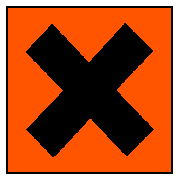International Chemical Safety Cards
| o-AMINOPHENOL | ICSC: 0824 |
o-AMINOPHENOL |
 |
| TYPES OF HAZARD/ EXPOSURE |
ACUTE HAZARDS/ SYMPTOMS |
PREVENTION | FIRST AID/ FIRE FIGHTING |
| FIRE | Combustible. Gives off
irritating or toxic fumes (or gases) in a fire. |
NO open flames. |
Powder, alcohol-resistant foam,
water spray, carbon dioxide. |
| EXPLOSION | Container may explode violently
in heat of fire. |
|
In case of fire: keep drums,
etc., cool by spraying with water. |
| EXPOSURE | |
AVOID EXPOSURE OF (PREGNANT)
WOMEN! |
|
| INHALATION | Blue lips or finger nails. Blue
skin. Cough. Dizziness. Headache. Laboured breathing. Unconsciousness. Symptoms may be
delayed (see Notes). |
Local exhaust or breathing
protection. |
Fresh air, rest. Artificial
respiration if indicated. Refer for medical attention. |
| SKIN | (further see Inhalation). |
Protective gloves. |
First rinse with plenty of
water, then remove contaminated clothes and rinse again. |
| EYES | Redness. |
Safety goggles, face shield, or
eye protection in combination with breathing protection. |
First rinse with plenty of water
for several minutes (remove contact lenses if easily possible), then take to a doctor. |
| INGESTION | (further see Inhalation). |
Do not eat, drink, or smoke
during work. |
Rinse mouth. Induce vomiting
(ONLY IN CONSCIOUS PERSONS!). Refer for medical attention. |
| SPILLAGE DISPOSAL | STORAGE | PACKAGING & LABELLING | ||
| Sweep spilled substance into
sealable containers. Carefully collect remainder, then remove to safe place. Remove vapour
with fine water spray (extra personal protection: complete protective clothing including
self-contained breathing apparatus). |
Separated from strong oxidants,
strong acids, food and feedstuffs. Tightly closed. Cool. Dry. Keep in the dark. |
Airtight. Do not transport with
food and feedstuffs. Xn symbol R: 20/21/22 S: 28 UN Hazard Class: 6.1 UN Packing Group: III |
||
| SEE IMPORTANT INFORMATION ON BACK | ||||
|
||||